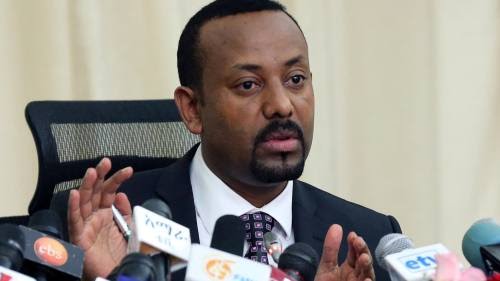/by Tom Wilson, East Africa Correspondent/
Abiy Ahmed faces questions after upsurge in ethnic violence
Abiy Ahmed, Ethiopia’s new prime minister, is facing questions over his ability to deliver on promises of democratic reform after a crackdown by government security forces following a recent spate of violence.
Since taking power in April Mr Abiy has overseen the release of thousands of political prisoners and welcomed exiled opposition leaders back to the country. But his relaxation of state control has been accompanied by an upsurge in ethnic violence.
This month at least 28 people died in the capital, Addis Ababa, in violence involving youth groups and security forces that flared when political leaders from the country’s south returned from overseas.
“Abiy has done a lot to bring dissatisfied groups, factions and actors back into the political process, to normalise their status, and that has created a lot of optimism,” said Michael Woldemariam, an Ethiopia expert at Boston University.
“On the other hand, you’ve got a country with a long history of authoritarianism, with a very difficult history of ethnic politics and you’re almost taking the lid off a lot of those tensions,” he said.
You’ve got a country with a long history of authoritarianism, with a very difficult history of ethnic politics and you’re almost taking the lid off a lot of those tensions
Ethnic violence had broken out sporadically around the country in recent months but Mr Abiy’s administration had done little in response until last week.
The government arrested more than 3,000 people in the capital in a crackdown reminiscent of the actions of some of Mr Abiy’s predecessors. About 1,200 of those detained had participated in the violence and are now being given “rehabilitation education” at a camp outside the capital, the Commissioner of the Addis Ababa Police Commission said on Monday.
Mr Abiy’s chief of staff condemned the violence on behalf of the prime minister, but his office has made no comment on the police response.
For some observers, the clampdown is at odds with Mr Abiy’s commitment to reform. “While the Ethiopian authorities have in recent months made a commendable attempt to empty the country’s prisons of arbitrary detainees, they must not fill them up again by arbitrarily arresting and detaining more people without charge,” said Joan Nyanyuki, Amnesty International’s director for east Africa.
For others the challenge facing Mr Abiy is more complicated. Rashid Abdi, Horn of Africa project director at the International Crisis Group, said the end of the old order had uncorked multiple forms of discontent. “The pressure was mounting on [Mr Abiy] to be seen to be firm” in response, he said.
Ethiopia is a vast country of 105m people from around 80 ethnic groups, divided among nine ethnic regions. The ruling coalition, the Ethiopian People’s Revolutionary Democratic Front, in power since 1991, includes member parties from four of the ethnic regions but has long been dominated by the Tigrayan People’s Liberation Front. The ethnic Tigray represent only about 6 per cent of the population.
Mr Abiy, an ethnic Oromo from southern Ethiopia, has promised a more inclusive form of politics. Where the EPRDF of old sought to suppress dissent — it currently controls all seats in the parliament — Mr Abiy has preached reconciliation.
“The state wants to democratise but without compromising the rule of law and it is struggling to find a balance between the two and to respond with proportionate force,” said Hallelujah Lulie, a regional security analyst based in the Ethiopian capital.
One solution is economic, according to Mr Hallelujah. The EPRDF has recorded impressive growth rates in the last decade but struggled to create enough jobs for Ethiopia’s rapidly growing population. “It comes back [to] a lack of opportunities, a lack of jobs, that lies behind the violence,” Mr Hallelujah said.
Mr Abiy has pledged to open up the country’s tightly controlled economy to investment but that will take time. In the meantime Ethiopians are likely to see a “tougher Abiy” according, International Crisis Group’s Mr Adbi.
“I can’t doubt Abiy’s instincts for reform, he’s taken a lot of risks” Mr Abdi said. “But he’s also an ex-intelligence officer, so he has that security training and sensibility and I think that is now beginning to assert itself.”
/Financial Times/

























